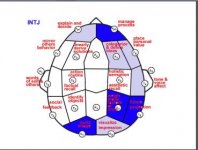So in other words Ti can shift either way based on whether it is used with an intuitive or a sensing function. My question however, is whether it is a right or left brained function in general? It sounds like you think it leans more towards the right brain?
I'm sorry maybe I wasn't clear the answer is in the 3rd paragraph. I'll try to go into more detail in this post.
Ok so lets recap in my op I said
"The Ti function gives Ti doms the ability to dissect and analyse from different angles to collect information and add those details to its internal framework. Ti is logical but it is a subjective way of thinking as a whole opposed to objective because of the direction of the T. Ti does not take facts into account for the sake of facts but to serve it's own internal subjective framework"
Now let's break this point down:
What I failed to explain here is looking at the different regions of the brain the ability to do this and the side of the brain that allows a Ti user to do this is ambiguous. That is why Ti differs depending on Se and Ne. Dario Nardi uses a diagram of the brain to show the different regions Ti doms (ISTP and INTP) that register as having the highest levels of activity:
ISTPs have Fp1(top left side of the brain ) P3(lower left side)02(bottom right side) and P4(lower right side) as highest levels of activity.
INTPs have Fp1(Top left side of the brain) F3 (top left side)F4(upper right) and C3(upper left) as highest levels of activity.
The only region they have in common in the highest activity range is Fp1 which is a region located in the left side of the brain. Dario Nardi defines Fp1 as the "chief judge: Focus on explaining, making decisions, noting errors and screening out distracting information."
Does that sound like Ti? Somewhat but not really. Ti is analytic and it is a judging function but a big part of Ti is seeing things as individual parts of a whole. Not just analysing them but dissecting AND reconstructing them based on their internal frame work. Not just deciding which angle to accept but seeing from many different angles. Fp1(top left) is not entirely responsible for Ti yet while looking at the highest level of brain activity in 2 Ti doms it is the only common region. That is why I feel Ti depends on Se and Ne for orientation. When you think about it it makes sense. You are going to need a very different mental tool box to dissect and reconstruct physical objects opposed to dissecting and reconstructing a complex theory.
Ti is more like a lump of clay that is shaped by it's user to produce a unique result than it is a mass produced mold that can only produce one final product. It is ambiguous by it's very nature both objective and subjective left and right. So to answer your question I lean towards neither left or right when looking at Ti as a stand alone function because I don't believe Ti can stand alone as a function.I have found nothing in my research to suggest that it can. Ti needs a subject because unlike Te it does not value information for the sake of information. It values facts and logic for a specific purpose,to fit into a unique personal frame work and therefor cannot stand alone as either left or right brained.
If your really interested in the neuroscience behind type you should invest in The neuroscience of personality. I do my best but there is a LOT more that can be said regarding Ti. His book really explains how the brain works together to establish types and functions and does so a lot better than can. It's an excellent research tool and can award you a lot of clarity when dealing with types and functions from the neurological perspective. The book is inexpensive and invaluable and it also includes some self typing tools regarding mbti.
[MENTION=15371]RaptorWizard[/MENTION] , Your right! I may us Ti a little more than I thought. As much as i'd love to toot my on horn about the an INFJs use of Ti I know my Ti is no where near as developed as a Ti dom and never will be

. I really don't think my thought processes are as clear when I explain them. I also find I think really metaphorically and can hardly explain anything without using one. I'm pretty elated that someone said I used Ti because I've been trying to develop it as much as I can while i'm still being academically stimulated regularly( I'm still in college). I'd be happy to share my thoughts with you about ITP's. Send me a message and I i'll give you my whole take on it. ITP's are fascinating to me and I'm hoping you can give me a glimpse of what your experiences are with being an ITP as well



